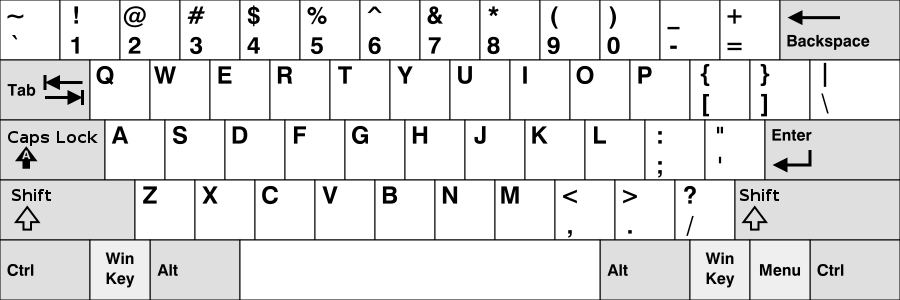I, an ignorant, lazy, hubristic, and (most-importantly) impatient American, need to add this preface, so I will have enough letters for this to be counted as an answer.
One word:
Keyboard
Please, before you take offense at my use of adjectives, read the second-to-last paragraph before the note about dıacrıtıcs ın English.
Now that I've made this answer longer anyway, I shall give some exposition. As an English-as-a-first-language American who has worked with diacritics and accent marks and slashed letters quite a bit, I give the explanation that the US English keyboard (at least with the Windows default) contains no letters wıth dıacrıtıcs, with the possible exception of the tittle1.
Neither does the United Kingdom keyboard have any differentiating/distinguishing diacritics, unless you use the Alt Gr key, but I'll just show the American, <hubris>because it's American!</hubris> Check it out!

(attribution / source)
Let's see it with the lower-case letters. (Note that there's no Alt Gr option for us default, ignorant American users of Windows.)

(source)
Most English-speakers English-typers [sic] use only one keyboard layout. There are people such as I, who, for purposes including genealogy work, has a-dozen-or-so keyboard layouts set up on my computer.
Let's go through a stream of consciousness that I might have whilst using diacritics in genealogy: "OK, Lithuanian, that means push Ctrl+Shift ... hmm ... seven times, then I have to hit Caps Lock. Now, push Shift ... umm ... it's above the ... 3? No ... 4? No ... 5? No ... 6? There it is!" On my computer screen pops us an Š, and I can write the place-name, Šiauliai.
Most who do have extra keyboard layouts aren't as OCD as I am. Let's say that I want to talk about a couple of composers. Back to my thoughts: "Oh, shoot, I don't have Czech set up on my computer. Time for Google Translate. Choose to translate from Czech. Click the drop-down keyboard. Who cares what I translate to ..." Some typing and then copy ... Go back to my document about music and money and paste the name, Leoš Janáček. Back to my train of thought, "Shoot, I can't find the u with a circle over it. (Note to future self, it's where the American English keyboard has a semicolon.) Forget that, I'm heading to Wikipedia. Type the name - yes, without diacritics ... There he is! Copy, paste. Boom!" Hooray, now we have Bohuslav Martinů on the page. "Okay, most everything uses Alt Gr+E for Euro. Good. Shoot! Where's the percent symbol? Dang, I switched back into French instead of English..."
I hope I've illustrated a bit the reason why we lazy, impatient, and ignorant (@tchrist♦) as well as hubris-ful (@hunterhogan) American English speakers don't use diacritics.
By the way, I have no arguments with those characterizations for Americans, but I won't claim them for the Brits. (It's all in good fun, friends, no offense taken or meant.)
If you'll excuse me, I'm going to read this site, entitled Orthographic diacritics and multilingual computing, while listening to some Fryderyk Franciszek Chopin, - the Polish version, so I don't have to use those funny ink splotches that one often sees near the letters of his name, or that "Fr%C3%A9d%C3%A9ric Fran%C3%A7ois Chopin" version ... dang (verb version of "dang") his French father who moved to Poland and then sent his prodigious, 21-year-old son back to Paris ... It's as if he didn't foresee English-speakers from around the world discussing his son on the keyboard-layout-dependent Internet ...
Note 1: Dıacrıtıcs ın English
There is the tittle, which I, as well as others, do consider a diacritic. However, as was well stated in Evertz, Martin, Visual Prosody: The Graphemic Foot in English and German, Walter de Gruyter GmbH & Co KG, Jun 25, 2018, p.43,
The dots in <i, j>[,] ... in contrast to other diacritics, ... do not bear any function [and] do not even distinguish letters from each other in the writing system under consideration.
The emphasis is mine. Opposing argument link. ... My rant, which @ChrisH correctly pointed out was extraneous. (Sorry, I got excited.)


